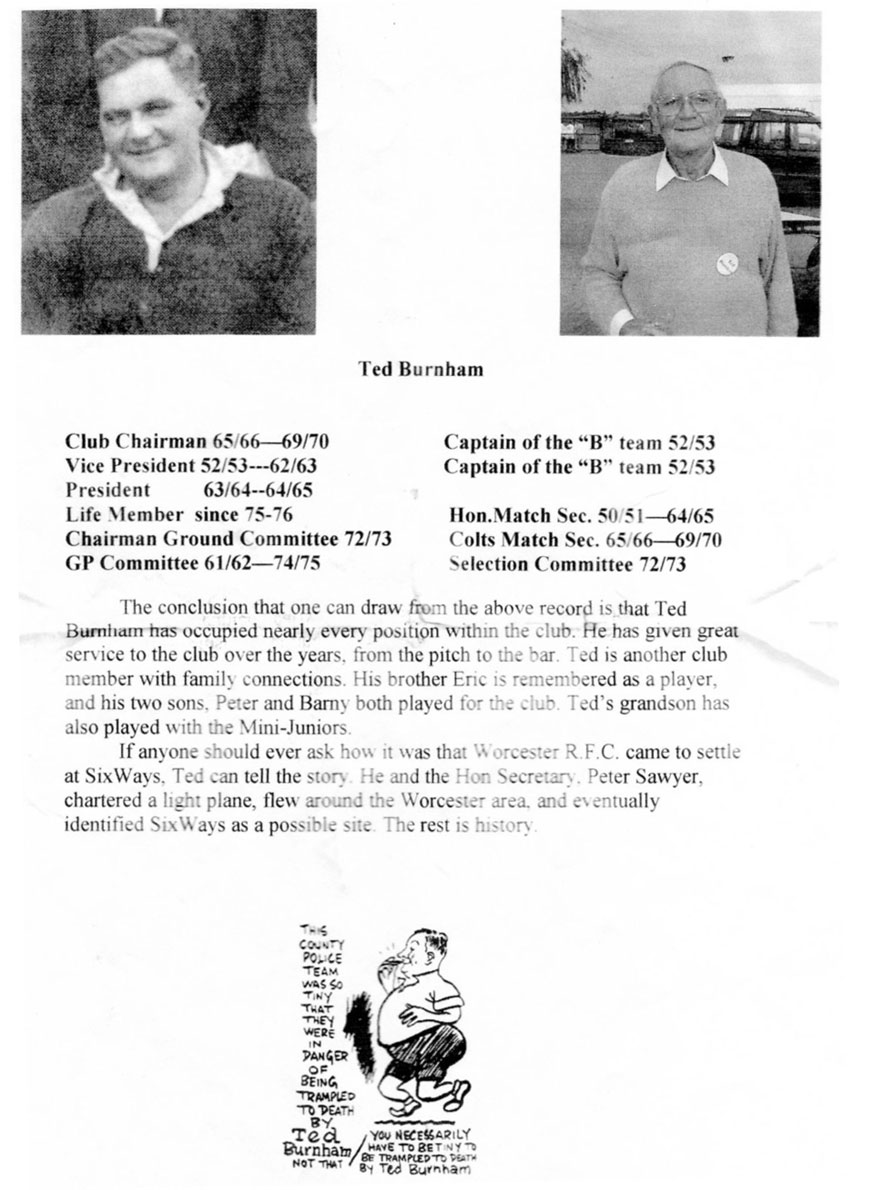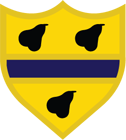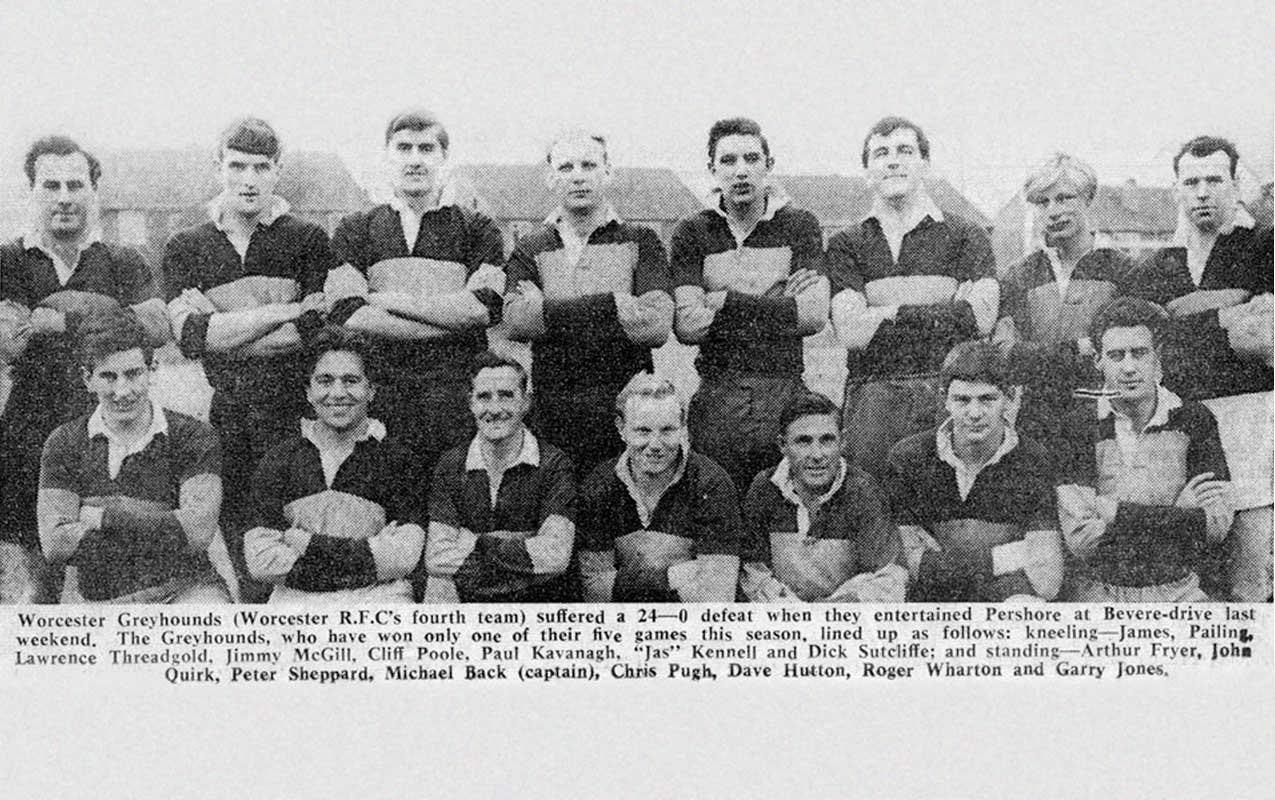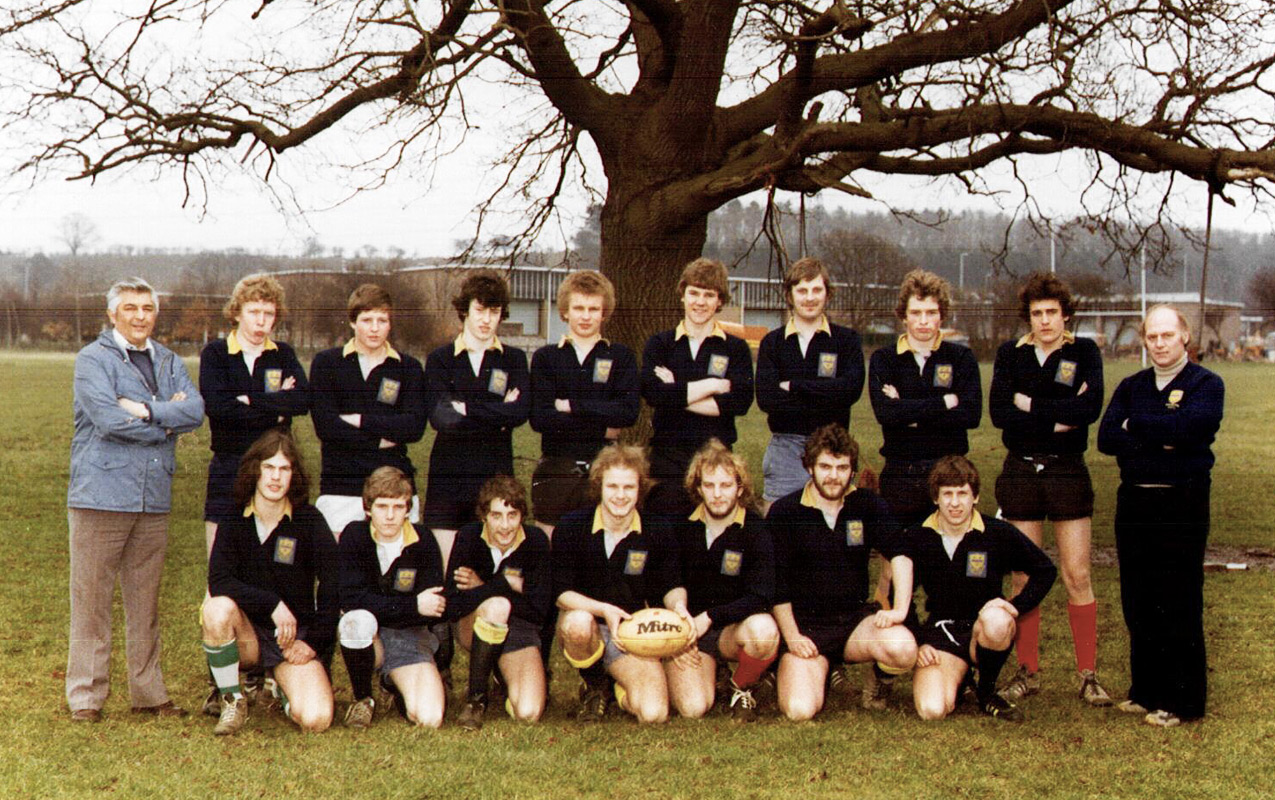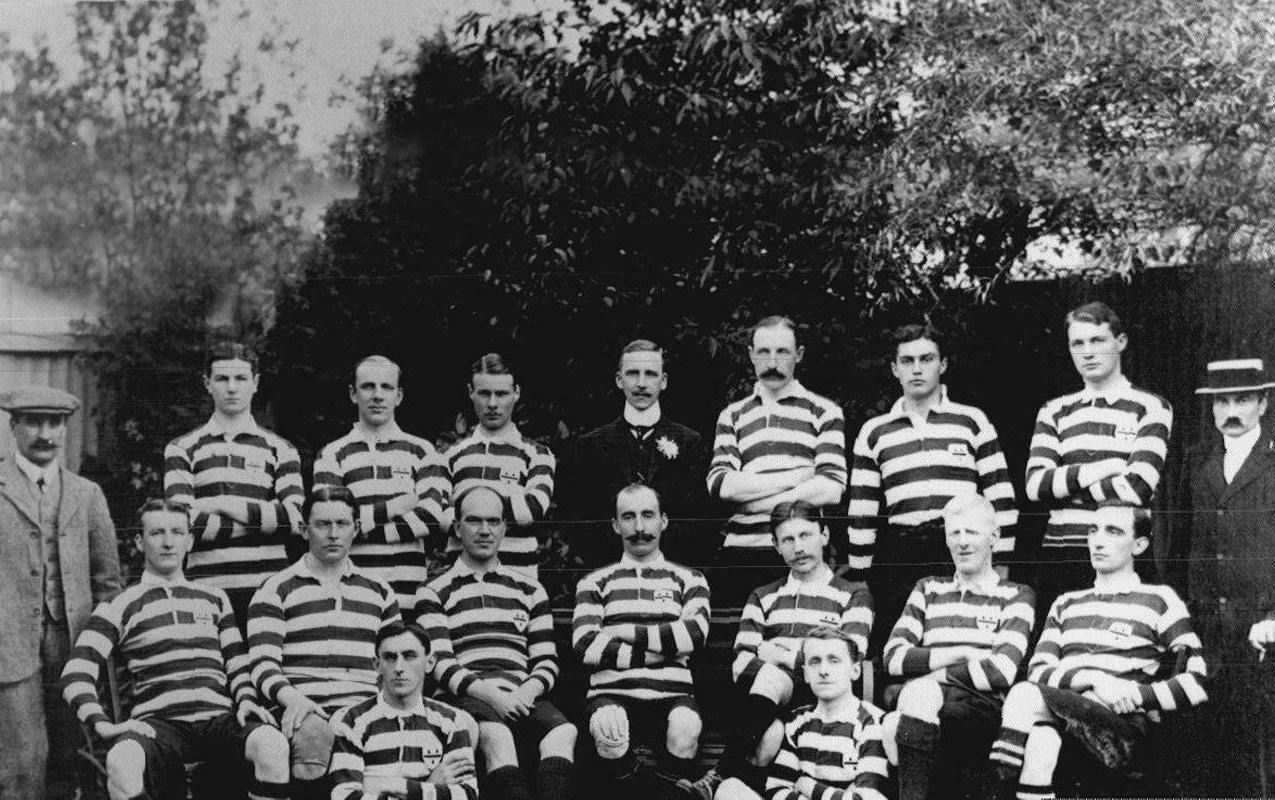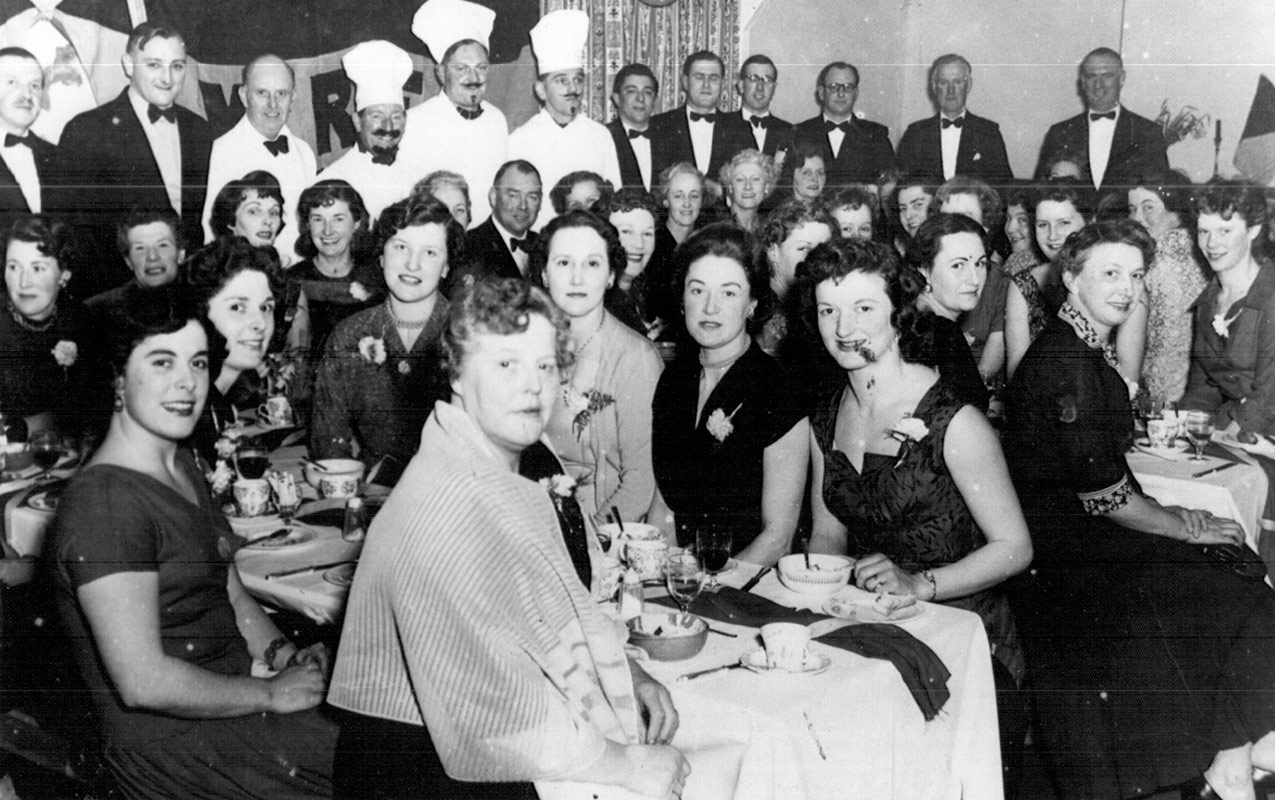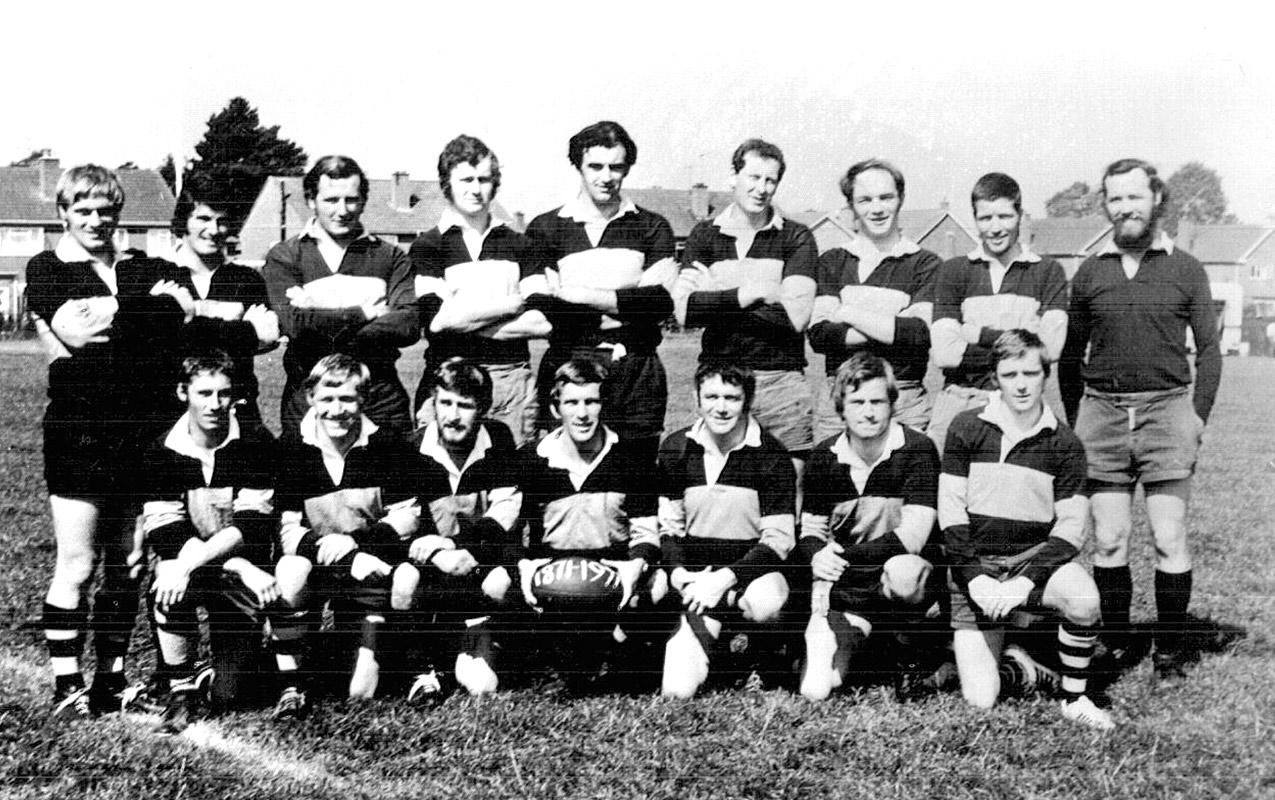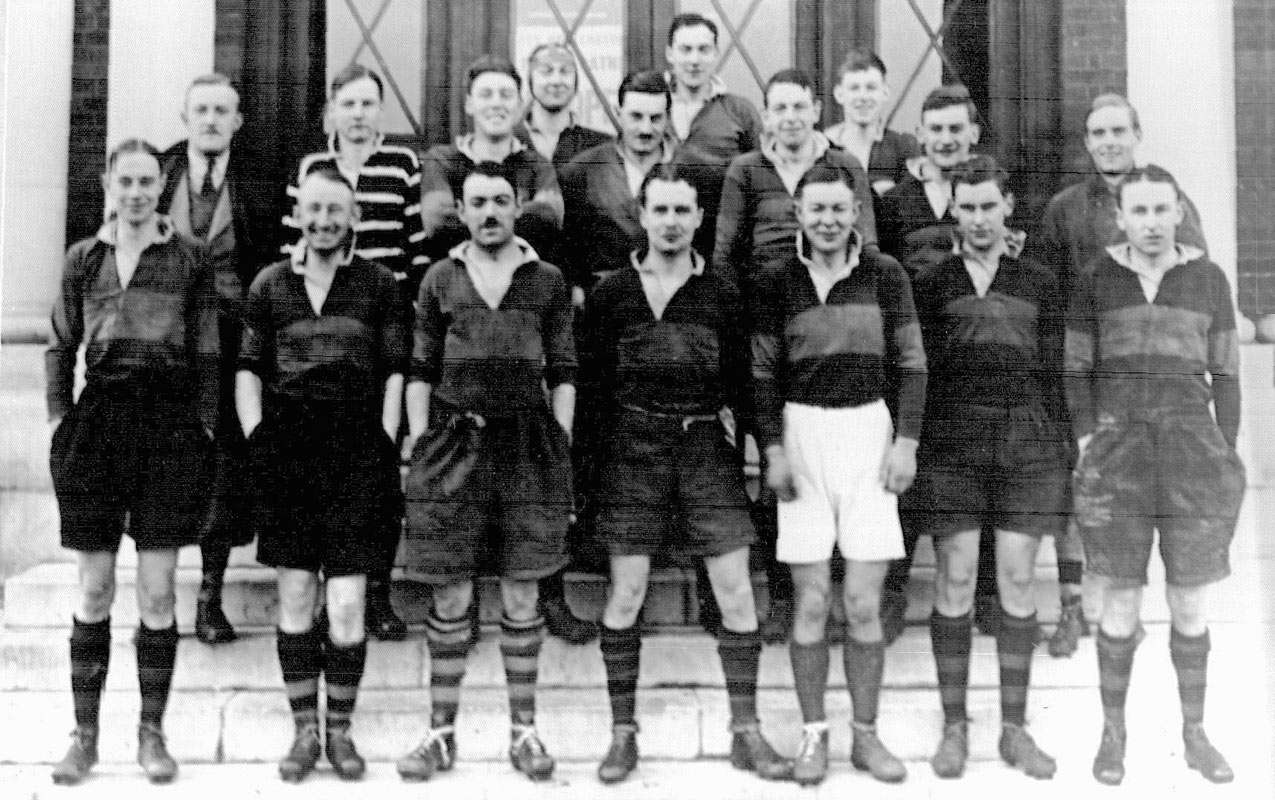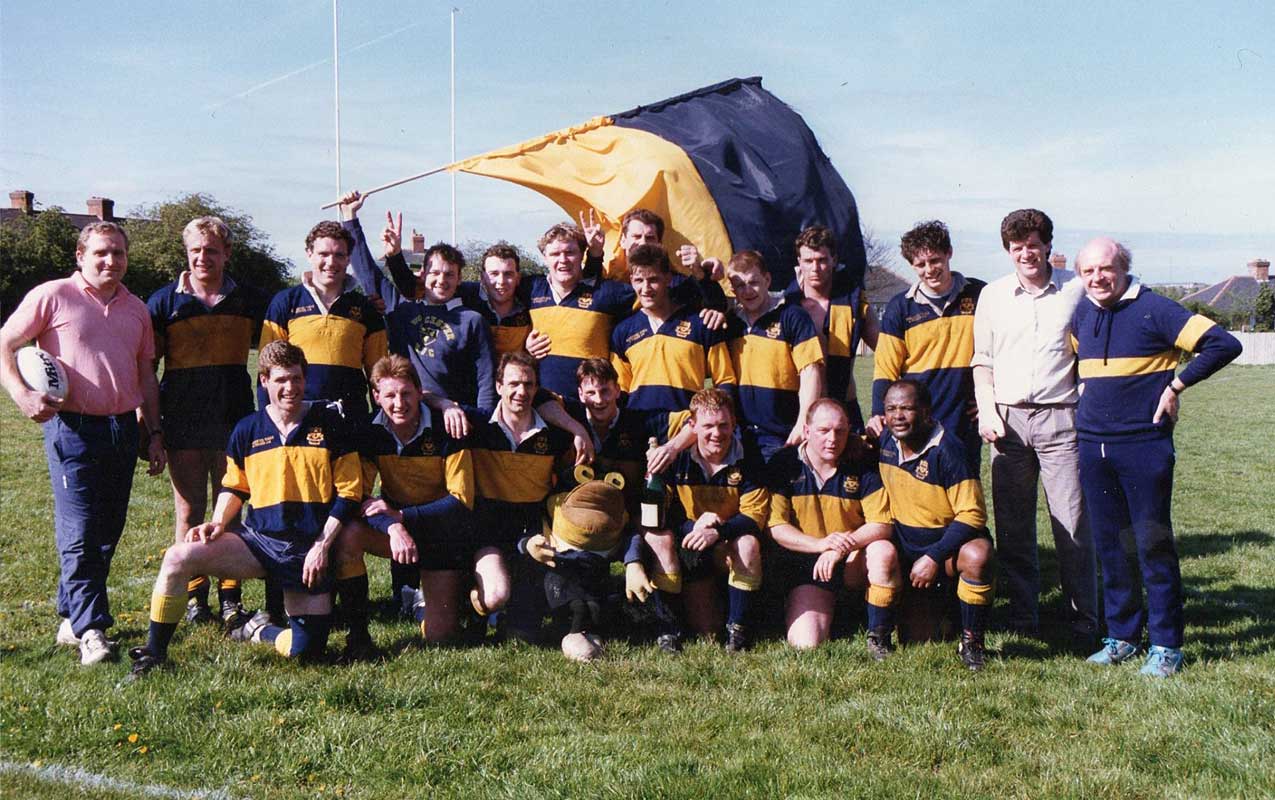Customer login
Not registered yet?
Register now! It is easy and done in 1 minute and gives you access to special discounts and much more!
Ted Burnham
By Barney Burnham
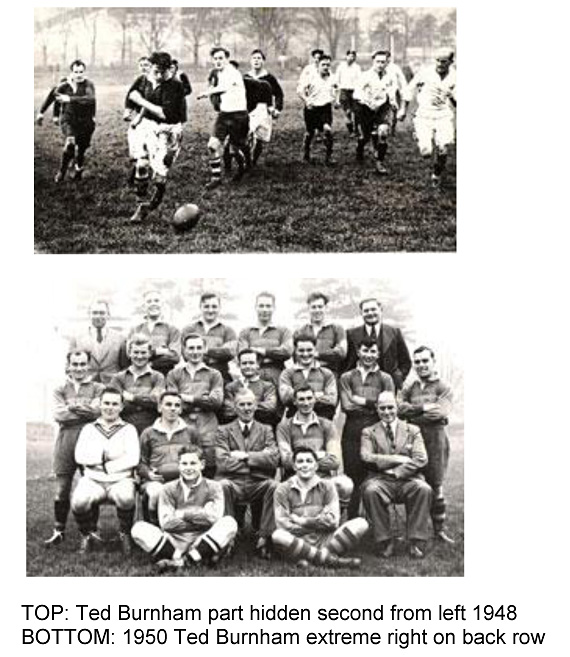
I must have been about four or five when rugby first came into my life. I’d probably been aware of it for a while, since it was something which took up a lot of Dad’s time, but the first clear memory is of being taken to watch Worcester playing a match at Perdiswell. I’ve no idea who they were playing, but the reason why the memory is still vivid is the fact that a kick to touch landed heavily on my infant head, which may explain a lot!
At the time, we were living in Stoulton, but it wasn’t long after that game at Perdiswell that Worcester acquired their own ground, in Bevere. As luck would have it, a house alongside the ground (in Green Lane) came up for sale, Dad bought it, and we suddenly had two rugby pitches as the extension to our garden. Happy days!
Along with friends, who included Art Shrimpton (brother of Dave, son of Ray), I spent endless hours out on the field, often using balls kindly provided by Cyril Waters, whose Bevere Drive home also backed on to the ground.
Cyril - aka The Silver Fox is one of the players I remember from those childhood days. A full-back with a mighty boot and one of the best place-kickers of his day. Alongside him were the likes of Tony George, Brian Wilkes, Don Everton, George Everton (Dad’s companion on many an international trip, of which more anon), Bernie Blower. They soon made way for people like Lou Wadley, Jeremy ‘Jem’ Richardson, his brothers, Martin and Peter, George Harrison (no, not that one!), Bill Mercer, David Hallmark, Neville South, Tony Halford, Guy Litherland, John Armour and Pete Baxter.
Baxter was a true (and classy) utility back, who could play in any position behind the scrum. As a scrum-half, he captained the highly successful side of the mid-60s, before moving to Stourbridge, who were our biggest rivals at the time.
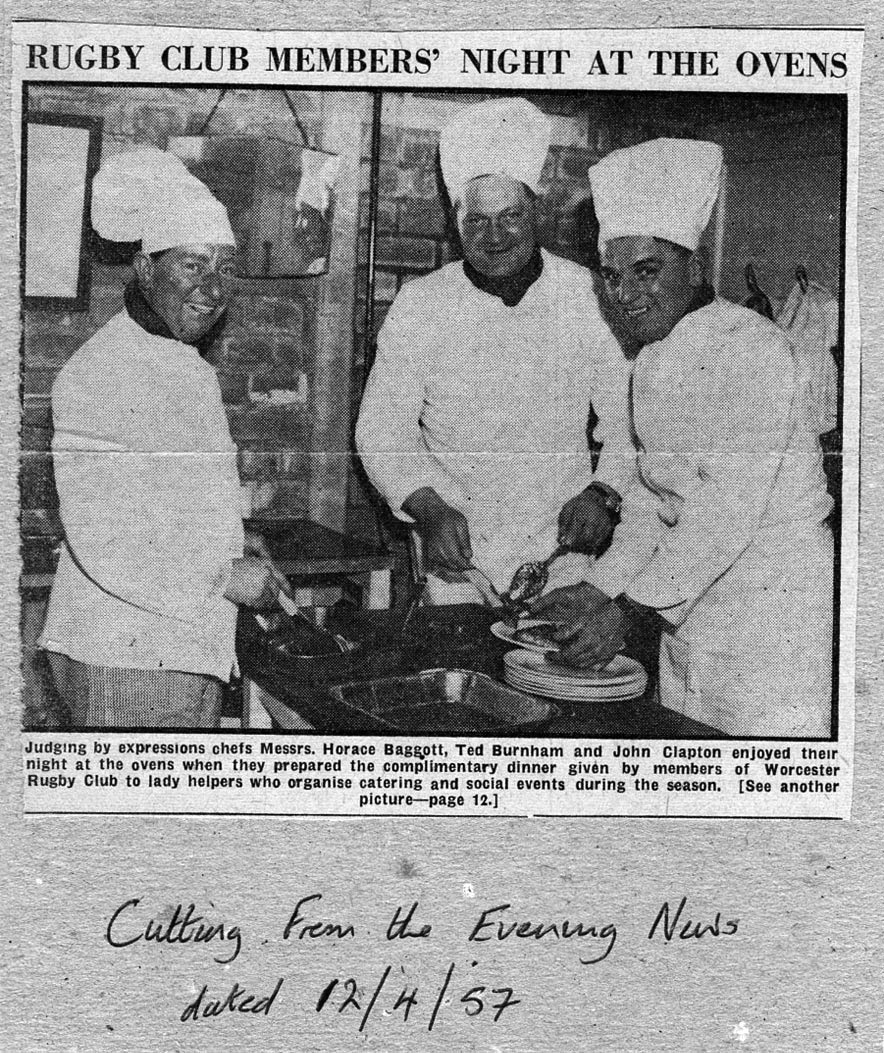
I watched all the home games, and as many away games as I could manage - tricky during school term, as I was at King’s, who had lessons on Saturday mornings. I always made sure to get hold of a copy of The Green ‘Un. I think it cost 3d, and was usually out just before 6pm on Saturday. On one occasion, Lou Wadley kindly gave me a lift back to school and even more kindly lent me the money to buy my copy. I don’t think I ever repaid him. Perhaps he could be persuaded to write off the interest.
One particular away game, on Christmas Eve 1966, marked the occasion when I wrote my first published match report. I think it was at Old Edwardians. The Green ‘Un’s reporter, probably Mike Pryce, couldn’t make it, so I was coerced into filling in for him. Those were the days when you had to phone the office and dictate your purple prose to a copytaker. It could be a lengthy process, as it often involved painstakingly spelling out some words, and you had to keep feeding the phone box. Shoving an old sixpenny bit into the slot was rather painful, in more ways than one. Nowadays, it’s all so easy. The wonders of technology mean that you can file your report within minutes of the final whistle. Progress.
It was in the late sixties that the Worcester sevens became a big attraction. Dad’s friendship with the former Cardiff and Wales scrum-half Bill Hullin meant that big names like Stuart Watkins and Keith Jarrett were seen at Bevere, in the Hullin’s side which lifted the trophy on a couple of occasions. Worcester’s status meant that international players rarely played at Bevere, although England and Lions flyhalf Bev Risman appeared there, in the colours of Loughborough Colleges. Given the talent which Loughborough used to attract, it’s highly likely that plenty of future internationals turned out against us. Former England centre Malcolm Phillips played for Davenport at Bevere, after his international days were over.
In 1968, England Schools held their final trial at Bevere, and one future England and Lions legend was amongst the hopefuls on display. Roger Uttley went on to captain his country and play in all four Tests on the invincible 1974 Lions tour. He then became a highly successful coach. He and Ian McGeechan coached the victorious 1989 Lions in Australia and he then guided England to a Grand Slam in 1991, before ending his tenure in that year’s World Cup final, against Australia.
Off the field, Dad’s role as club secretary had a major impact on home life - never more than on Friday nights. That was when the phone never stopped ringing, as large numbers of players (mainly from the lower sides) called to pull out of Saturday’s game, or to announce complicated plans to meet up with the team bus, en route to away games. It usually involved stopping at a pub, to see whether X,Y or Z was there, as planned.
Relations with the neighbours in the Bevere area were generally harmonious, but there was one notable exception. His house was behind one end of the 1st XV pitch. If the ball landed in his garden, you could write it off for the rest of the game. He complained about the monthly disco. He complained when the opposition bus stopped outside his house to let the players off, before negotiating the tricky turning into the ground. One year, Dad decided he’d had enough. On Christmas Eve, he drove one of the H & E Burnham coaches into Bevere Drive and parked it outside Mr. Grumpy’s house. Unfortunately, Mr G immediately called the police and Dad was forced to move the bus. A few years later, Mr Grumpy changed his tune, when it emerged that Bevere Drive was being sold for housing!
Dad played a key role in the move to Sixways. In the early 70s, aware of the need to move to somewhere with more space (and no curmudgeonly neighbours), he chartered a light aircraft for an hour, took to the skies with a club member who was a surveyor and scoured the neighbouring countryside for a possible site for a new home. They identified somewhere suitable, near junction 6 of the M5. The rest, as they say…
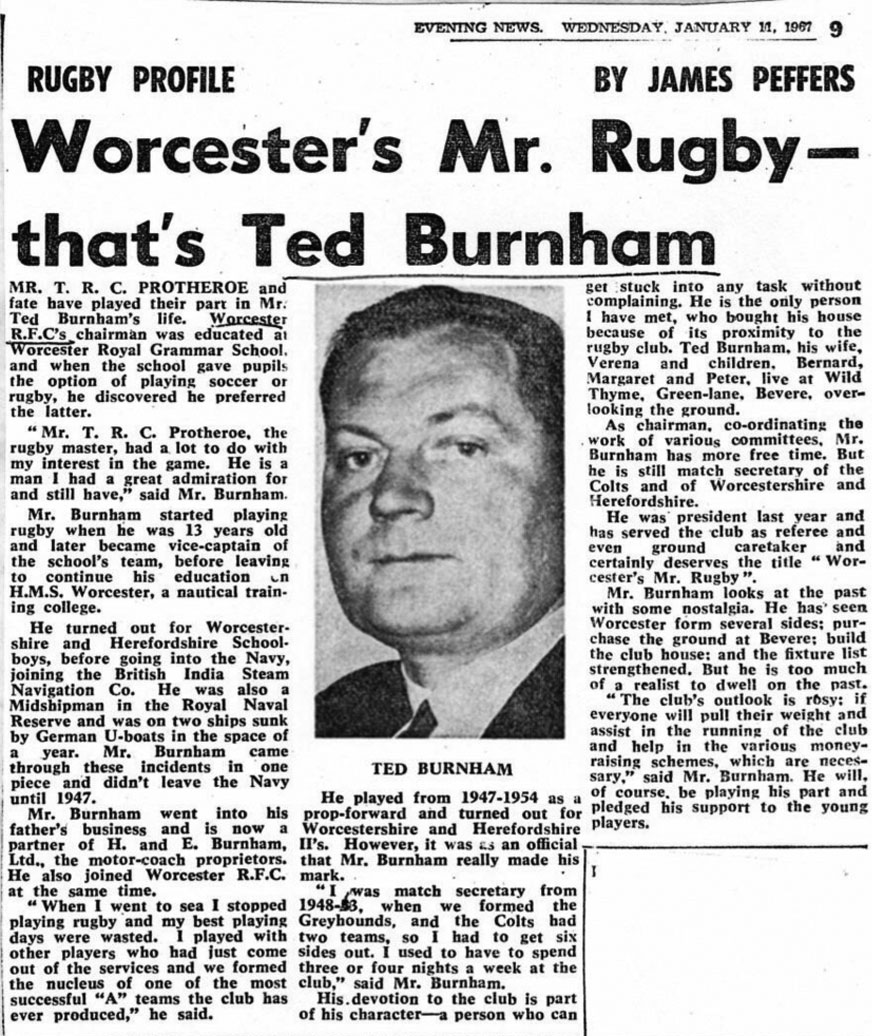
Sixways opened in 1975, with Worcester taking on an invitation team captained by the great Mike Gibson, of Ireland and Lions fame. He was one of Dad’s all-time favourite players, but, sadly, Dad wasn’t there to watch. By now, he’d decided to turn his back on the family business and go back to sea. Another Welsh friend ran a small shipping company and kindly found Dad a position as an officer on one of his ships.
The return to sea only lasted a few years. In 1977 or 78, while moored off Baltimore, Maryland, Dad suffered a major heart attack. He survived, thanks to the doctors and staff at Johns Hopkins Hospital, but his seafaring days were over. He returned to Worcester and spent most of the rest of his working life doing the books for an estate agent. By now, he was no longer part of the WRFC committee, but he remained interested in the club’s fortunes - although his visits to matches became fewer and further between.
When Worcester Warriors finally won promotion to the Premiership, in 2003/4, Dad was very touched to receive a call from Cecil Duckworth, inviting him to the Mayor’s lunch at the Guildhall, to celebrate the team’s success. Cecil, who had known Dad for many years, from his Worcester Rowing Club days, told him that it wasn’t just about the present, it was also about everybody who had played a part in taking the club to where it then was. That meant a lot to Dad.
Dad devoted a large part of his life to the club. The Worcester Evening News once described him as ‘“Worcester’s Mr. Rugby”. Probably his proudest moment was when he was invited to return for a second stint as President, in the club’s centenary year. He adopted, as his theme, a couple of lines from Kipling’s World War One poem ‘A Song in Storm’.
The game is more than the player of the game,
And the ship is more than the crew!
Next to family, rugby and sailing were the loves of his life, so those words really struck a chord with him. They appeared on every programme, dinner menu and brochure associated with the celebrations, and he used them in each of the many speeches he made during that season.
Like many of his generation, he was uncertain about professionalism. To him, rugby meant fun, and he wasn’t sure that modern, professional players would get as much pleasure and enjoyment as he had. Having worked with professional players for some time, I can respectfully tell him that he was wrong. Today’s players do enjoy themselves, but in a different and probably more socially acceptable way.
For him, the most valuable thing was the friendship. He enjoyed many international trips in the company of Don and George Everton, John Clapton, Brian Wilkes, Gerry Oldfield, Cyril Waters and others - apologies to those whom I can’t remember. His favourites were the annual trips to Dublin. He particularly enjoyed seeing Mike Gibson inspiring Ireland to beat the Welsh side who were hot favourites to win the Triple Crown. Many Welsh supporters arrived already wearing their Triple Crown ties.
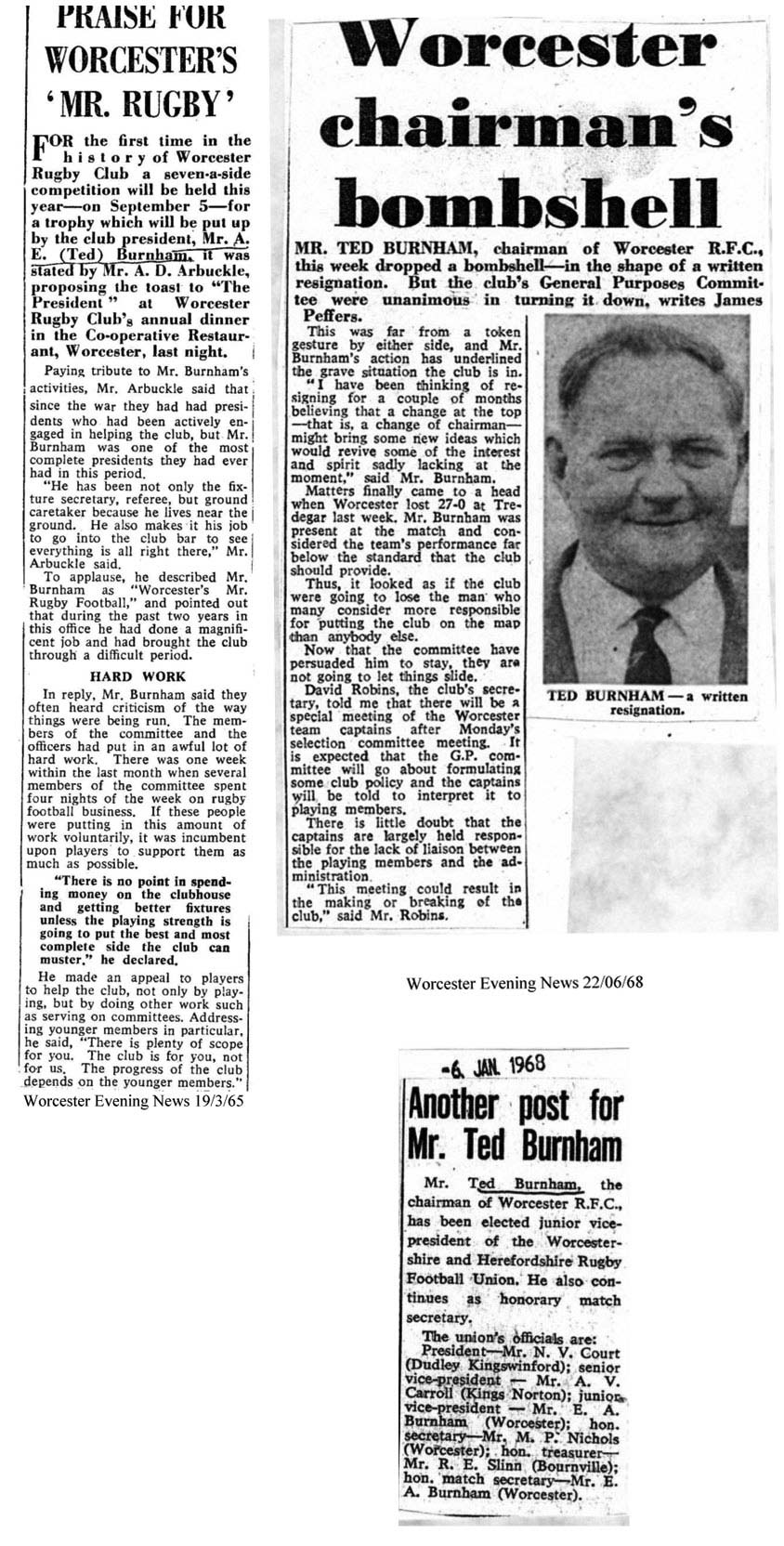
Dad and his mates would regularly take the overnight ferry from Holyhead to Dun Laoghaire, before enjoying the delights of the City on the Liffey, particularly its famous water. One year, somebody - possibly Don Everton - suggested that it might be worth booking a couple of cabins. They were all getting older, and perhaps a bit of sleep might be a good idea, ahead of a weekend in Dublin. The suggestion met with approval and the cabins were duly booked. Dad and co embarked, dumped their bags and adjourned to the bar. They returned to their cabins, just as the ship was pulling into Dun Laoghaire.
On another occasion, Dad, George Everton and my family came down to London for an international weekend. I was appearing in a show on the Friday night, which they attended. They returned to their hotel, which had a large bar. They were just beginning to go up the stairs when George suggested a nightcap. They finally got to their rooms at 6.45 a.m.
The whole family is proud of Dad’s contribution to the club, but also grateful that he passed his love of rugby on to us. I played regularly for the Colts, my brother played a few 1st XV games, various sons, daughters, nephews and nieces have played minis, while my brother coached minis for a while. We still have strong emotional ties to the club, even though our links and visits are far looser and less frequent. None of us could ever match Dad’s contribution and we’re all sure that he would be as delighted as we are to see its current state of health, as it marks such a magnificent milestone.
